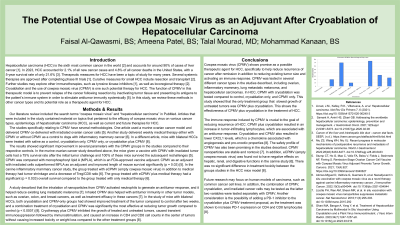Hepatocellular Carcinoma
(3) Enhancing Treatment of Hepatocellular Carcinoma with Cowpea Mosaic Virus as an Adjuvant Therapy
Saturday, September 23, 2023
6:00 PM - 7:30 PM East Coast USA Time

Talal Mourad, MD – Graduate, University of Illinois College of Medicine; Ameena Patel, BS – Medical Student, University of Illinois College of Medicine; Mohammad Kanaan, BS – Graduate, University of Illinois Urbana Champaign
Purpose: Hepatocellular carcinoma (HCC) is considered to be the sixth most common form of cancer and was responsible for roughly 4.8% of cancer-related deaths in the US in 2023. Furthermore, HCC accounts for roughly 90% of primary liver cancers. Although cryoablation has risen in popularity as a treatment option for HCC, recent literature has investigated the use of immunostimulant therapies, such as the cowpea mosaic virus (CPMV), as adjuvants. CPMV is a plant-based virus, noninfectious to mammals, that uses nanoparticles as a vector for antigen presentation. CPMV has the ability to alter the tumor microenvironment and activate innate immune cells against the tumor. This abstract will therefore aim to review the use of CPMV therapy in this context.
Material and Methods: A systematic literature review was conducted using the PubMed database with the search terms “cowpea mosaic virus”, “immunostimulant adjuvants”, and “hepatocellular carcinoma” to evaluate the efficacy and safety of CPMV and other plant-based viral adjuvants, combined with chemotherapy or surgical resection, in treating HCC.
Results: The use of CPMV has been linked to tumor suppression. A recent murine HCC study paired CPMV and cryoablation, which led to CD4+ and CD8+ counts nearly five times and three times, respectively, that of the control. The difference in centrally located T-cell counts of the tumors was even greater when comparing CPMV+Cryo to control, CPMV, or Cryo treatments alone. Similar findings were reported in a murine ovarian cancer study. Within the group given irradiated tumor cells with CPMV, nearly 75% survived the initial tumor challenge, and 100% survived the rechallenge. Moreover, athymic mice given the same combination had no response, similar to unvaccinated, wild-type mice. In a canine inflammatory mammary cancer study, similar results were shown as the Treg+/CD8+ ratio decreased while CD3+ cells and tumor neutrophil infiltration increased, reducing tumor size. Both studies suggest a T-cell-mediated immunity to metastasizing tumors.
Conclusions: The development of a CPMV vaccine, with cryoablation, has shown great promise in metastatic cancers, especially HCC. The T-cell-generated response can bolster the immune system's ability to combat HCC metastasis to lymph nodes, systemic circulation, and venous circulation, potentially leading to a reduction in the current 70% recurrence rate after surgical resection. Further research should be focused on a combo treatment of irradiated tumor cells/CPMV/Cryo and human efficacy.
Material and Methods: A systematic literature review was conducted using the PubMed database with the search terms “cowpea mosaic virus”, “immunostimulant adjuvants”, and “hepatocellular carcinoma” to evaluate the efficacy and safety of CPMV and other plant-based viral adjuvants, combined with chemotherapy or surgical resection, in treating HCC.
Results: The use of CPMV has been linked to tumor suppression. A recent murine HCC study paired CPMV and cryoablation, which led to CD4+ and CD8+ counts nearly five times and three times, respectively, that of the control. The difference in centrally located T-cell counts of the tumors was even greater when comparing CPMV+Cryo to control, CPMV, or Cryo treatments alone. Similar findings were reported in a murine ovarian cancer study. Within the group given irradiated tumor cells with CPMV, nearly 75% survived the initial tumor challenge, and 100% survived the rechallenge. Moreover, athymic mice given the same combination had no response, similar to unvaccinated, wild-type mice. In a canine inflammatory mammary cancer study, similar results were shown as the Treg+/CD8+ ratio decreased while CD3+ cells and tumor neutrophil infiltration increased, reducing tumor size. Both studies suggest a T-cell-mediated immunity to metastasizing tumors.
Conclusions: The development of a CPMV vaccine, with cryoablation, has shown great promise in metastatic cancers, especially HCC. The T-cell-generated response can bolster the immune system's ability to combat HCC metastasis to lymph nodes, systemic circulation, and venous circulation, potentially leading to a reduction in the current 70% recurrence rate after surgical resection. Further research should be focused on a combo treatment of irradiated tumor cells/CPMV/Cryo and human efficacy.
